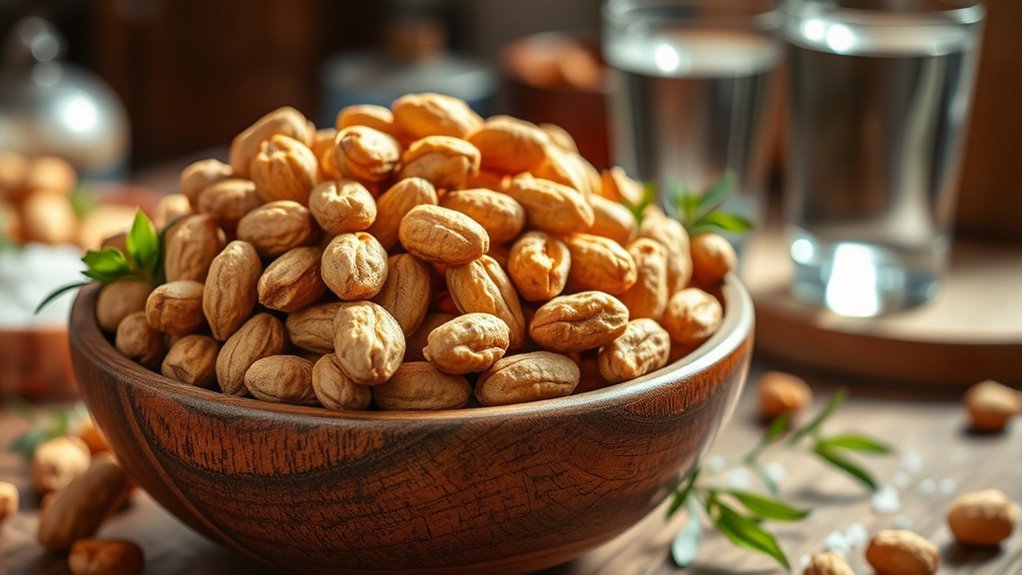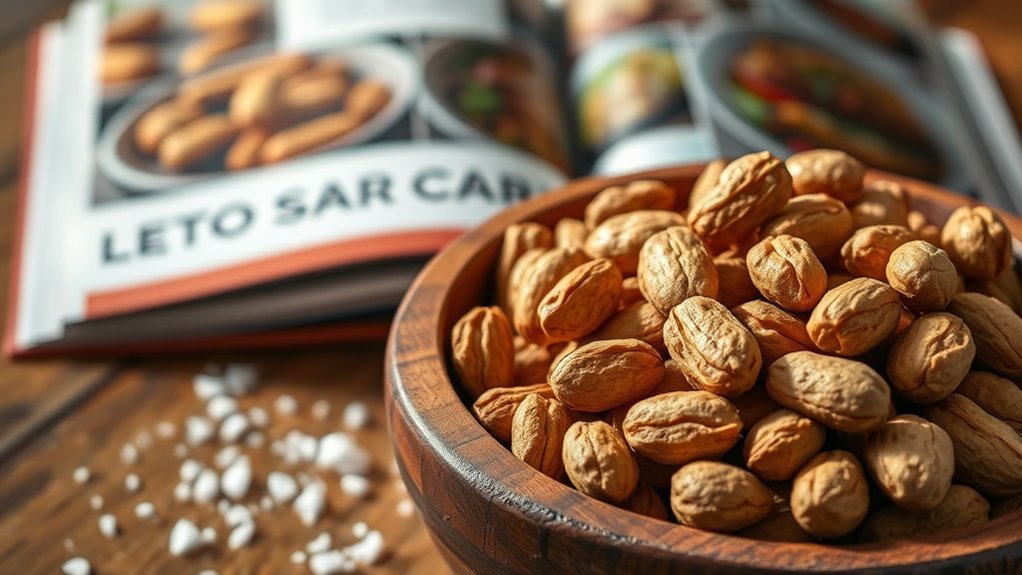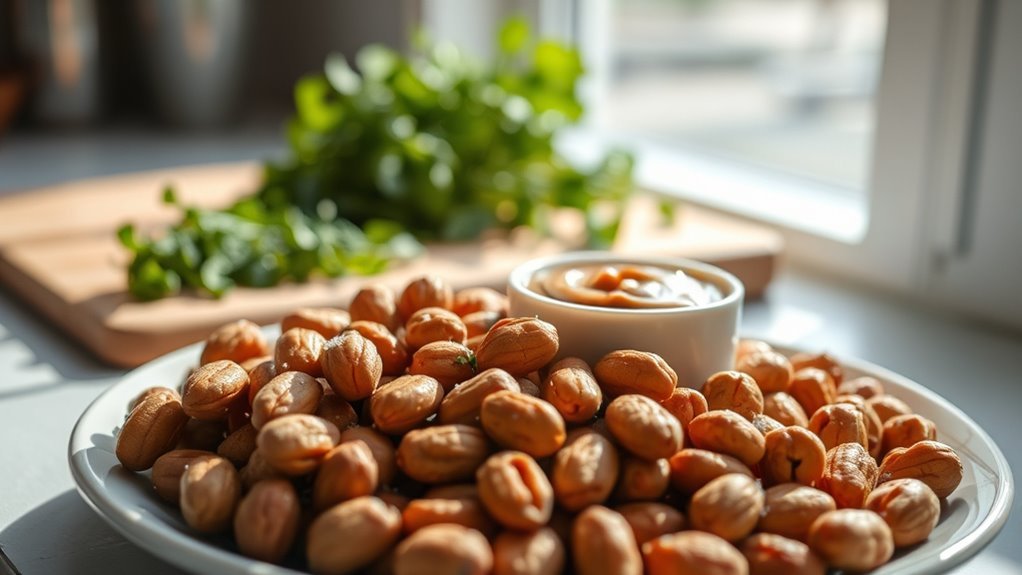Peanuts can fit into your keto diet when consumed in moderation. They’re rich in healthy fats and protein, but they also contain about 6 grams of carbs per ounce. While they offer health benefits like heart support and satiety, their higher carb content compared to other nuts can make it easy to exceed daily limits. Portion control is essential, and there are creative ways to incorporate them into meals. You might find more interesting ideas to enhance your keto experience.
Nutritional Profile of Peanuts

When considering the nutritional profile of peanuts, you’ll find they offer a unique combination of macronutrients that can fit into a keto diet. Various peanut varieties, including raw, dry-roasted, and unsalted options, provide impressive nutritional density. Peanuts are rich in healthy fats, primarily monounsaturated and polyunsaturated fats, which can support your energy levels while keeping carb intake low. They also contain a moderate amount of protein, making them a satisfying snack. Additionally, peanuts are packed with vitamins and minerals like vitamin E, magnesium, and potassium, contributing to overall health. Including these nutrient-dense legumes in your keto plan can give you the freedom to enjoy a tasty, satisfying option without compromising your dietary goals. Moreover, natural varieties of peanut products without added sugars ensure you maximize health benefits while adhering to your keto lifestyle.
Macronutrient Breakdown

When considering peanuts for a keto diet, it’s crucial to look at their macronutrient breakdown. Peanuts are primarily composed of fats and proteins, with a relatively low carbohydrate content, making them a potentially suitable snack. Understanding their nutritional composition can help you assess how they fit into your daily macros.
Nutritional Composition Overview
Peanuts are a popular snack choice, especially among those following a ketogenic diet, due to their unique macronutrient profile. They’re high in healthy fats—about 72% of their total calories—which makes them an excellent source of energy for keto enthusiasts. You’ll also find a decent amount of protein, around 25%, which can help with muscle maintenance while on a low-carb regimen. Plus, they contain fiber, which is essential for digestive health. Peanut butter, a favorite among many, retains this beneficial composition while offering a creamy texture that satisfies cravings. Incorporating peanuts or peanut butter into your keto snacks can add variety and nutrition, making it easier to stick to your dietary goals without feeling deprived.
Carb Content Analysis
A typical serving of peanuts contains about 6 grams of carbohydrates, which includes approximately 2 grams of net carbs after accounting for fiber. This makes peanuts a viable option among keto-friendly carb sources, especially when you consider their impressive fiber content. Fiber plays an essential role in digestive health and can help you feel fuller longer, which is vital on a low-carb diet. By incorporating peanuts, you can enjoy a satisfying snack without greatly impacting your carb intake. However, moderation is key; while their carb count is relatively low, it’s easy to overindulge. Balancing peanuts with other low-carb foods can help you maintain your keto lifestyle without feeling deprived. Additionally, peanuts are rich in healthy fats, which are beneficial for ketogenic diets.
Protein and Fat Ratio
With about 7 grams of protein and 14 grams of fat per ounce, peanuts offer a favorable macronutrient profile for those following a keto diet. Their combination of healthy fats and protein makes them a solid addition to your meal plan, especially when you’re looking for protein sources that won’t kick you out of ketosis. Peanut butter, a popular choice, contains similar ratios, making it a delicious and satisfying option. Including peanuts and peanut butter in moderation can enhance your keto journey while keeping your macronutrients balanced. Additionally, peanuts are relatively low in carbs, with 2-3 grams net carbs per ounce, allowing you to enjoy them without straying from your keto goals.
| Macronutrient | Amount per Ounce |
|---|---|
| Protein | 7 grams |
| Fat | 14 grams |
| Carbohydrates | 6 grams |
| Fiber | 2 grams |
| Net Carbs | 4 grams |
Health Benefits of Peanuts

While you might think of peanuts primarily as a tasty snack, they’re packed with several health benefits that can complement a keto diet. One of the key peanut benefits is their contribution to heart health. Peanuts are rich in monounsaturated fats, which help lower bad cholesterol levels and promote overall cardiovascular wellness. They also contain antioxidants, such as resveratrol, that can reduce inflammation and improve blood flow. Additionally, peanuts are a good source of protein and fiber, which can keep you feeling full and satisfied, aiding in weight management. Including peanuts in your keto lifestyle not only satisfies your cravings but also supports your heart, making them a smart choice for your health-conscious snacking. However, it’s important to note that their higher carbohydrate levels may not align with strict ketogenic goals.
Potential Risks and Considerations
While peanuts can be a tasty addition to a keto diet, it’s important to take into account their higher carbohydrate content, which could impact your carb limits. Additionally, if you have a peanut allergy, consuming them can pose serious health risks. Finally, practicing portion control is essential to avoid exceeding your daily carb intake and maintaining the ketogenic state. Furthermore, peanuts contain about 16 grams of total carbohydrates per 100 grams, making it vital to monitor your serving sizes carefully.
High Carb Content
Peanuts may seem like a tempting snack option for those on a keto diet, but their relatively high carb content poses potential risks. While they can be satisfying, you might want to contemplate other carb sources that better align with your keto goals. Here are some points to think about:
- Peanuts contain around 6 grams of carbs per ounce, which can add up quickly.
- Eating too many can kick you out of ketosis, affecting your energy levels.
- There are numerous keto alternatives, such as almonds and macadamia nuts, that are lower in carbs.
- Additionally, being mindful of your choices guarantees you stay on track with your keto diet while enjoying your snacks; consider the carb content of various nuts and seeds to ensure they fit within your daily limits.
Exploring other options can help maintain your desired state of ketosis and overall well-being.
Allergic Reactions Risk
Although many people enjoy peanuts as a snack, it’s important to take into account the risk of allergic reactions. Peanut allergies are one of the most common food allergies, affecting millions. If you have a history of allergies, consuming peanuts could trigger severe allergic reactions, ranging from hives to anaphylaxis. Even if you’ve enjoyed peanuts before, allergies can develop at any time. It’s vital to know your body and recognize symptoms early. If you experience any adverse reactions after eating peanuts, it’s wise to seek medical advice. For those without allergies, peanuts can be a nutritious snack, but staying informed about potential risks guarantees you can enjoy them safely. Always prioritize your health and well-being when making dietary choices.
Portion Control Importance
When you’re following a keto diet, understanding the importance of portion control with peanuts is essential for maintaining ketosis. While peanuts can fit into your low-carb lifestyle, it’s vital to be mindful of portion sizes to avoid exceeding your carb limit. Here are a few considerations:
- Peanuts are calorie-dense, so overeating can lead to weight gain.
- A typical serving size is about 1 ounce (28 grams) to stay within keto guidelines.
- Mindful eating helps you enjoy peanuts while keeping your macros in check. Additionally, incorporating low-carb vegetables can help balance your meals and maintain ketosis effectively.
Peanuts vs. Other Nuts on Keto
While many people on a keto diet turn to nuts for healthy fats and protein, the choice between peanuts and other nuts can be essential for maintaining ketosis. Peanuts, technically legumes, have a higher carb content compared to traditional nut varieties like almonds or macadamias. This means they can impact your daily carb limit more noticeably. However, if you love peanut butter, you can still enjoy it—just be mindful of portion sizes. Other nuts tend to offer lower carb counts and higher healthy fats, making them more suitable for keto. Ultimately, it’s about balancing your preferences with nutritional content. So, consider your options carefully to find what works best for your diet and lifestyle. Additionally, peanuts have a higher carbohydrate content than traditional nuts, which can affect your ability to stay in ketosis.
Portion Control and Serving Sizes
Understanding the carb content of peanuts compared to other nuts is just the beginning; portion control plays a significant role in enjoying them on a keto diet. Practicing mindful eating can help you savor the benefits while maintaining your carb limits. Here are some key points to take into account:
- A typical serving size of peanuts is about 1 ounce (28 grams).
- One ounce contains approximately 6 grams of carbs, making it essential to track your intake.
- Overindulging can lead to exceeding your daily carb limit, impacting your keto goals. Additionally, serving size significantly affects daily carb intake, so it’s crucial to measure portions carefully.
Ways to Incorporate Peanuts Into Your Diet
Incorporating peanuts into your keto diet can be both enjoyable and beneficial, especially if you get creative with how you use them. You can whip up delicious peanut butter recipes, like low-carb cookies or fat bombs. Roasted peanuts make perfect snacks, adding crunch to your day. Explore peanut flour uses in pancakes or as a thickener in soups. For a revitalizing treat, try peanut butter smoothies blended with unsweetened almond milk. Don’t forget savory peanut dishes, such as stir-fries or salads topped with a spicy peanut dressing. Peanut energy bites are great for on-the-go fuel, while creamy peanut dip ideas can elevate your vegetable platters. Finally, consider adding spicy peanut toppings to enhance your meals!
Final Thoughts on Peanuts and Keto
As you navigate your keto journey, it’s essential to recognize that peanuts can be a valuable addition to your diet. They offer a satisfying crunch and numerous health benefits.
- They’re low in carbs, making them suitable for keto snack alternatives.
- Rich in healthy fats and protein, they can help keep you full longer.
- Versatile in peanut butter recipes, they add flavor and nutrition to your meals.
While moderation is key due to their carb content, incorporating peanuts can enhance your keto experience. Whether as a snack or an ingredient, they offer variety without sacrificing your goals. Embrace the freedom to enjoy peanuts while staying true to your keto lifestyle, and explore creative ways to incorporate them into your daily meals.
Frequently Asked Questions
Can Peanuts Kick Me Out of Ketosis?
Peanuts generally won’t kick you out of ketosis if consumed in moderation. Their carb content is relatively low, with about 6 grams of net carbs per ounce. However, it’s crucial to monitor your overall carb intake to maintain ketosis. Individual responses can vary, so pay attention to how your body reacts. Enjoying peanuts in small amounts can provide healthy fats and protein without greatly affecting ketosis effects, giving you the freedom to indulge wisely.
Are Roasted Peanuts Better Than Raw Peanuts for Keto?
Roasted peanuts do have some benefits over raw peanuts for keto, mainly in flavor and digestibility. Roasting enhances taste while making them easier to digest. However, raw peanuts retain more nutrients, like vitamins and minerals, that can be lost during the roasting process. If you prefer the crunch and taste of roasted peanuts, go for it, but keep in mind that raw peanuts offer slightly better nutrition. Balancing both can be a great option!
Do Peanuts Contain Any Hidden Sugars?
Peanuts don’t hide sugar like a thief in the night; their nutritional profile reveals a low sugar content. You’ll find that they contain only about 1 gram of sugar per ounce, making them a decent choice for those watching their intake. While they’re rich in healthy fats and protein, it’s essential to enjoy them in moderation. Always check labels, as flavored varieties might sneak in additional sugars you didn’t expect.
How Do Peanuts Compare to Almond Butter on Keto?
Peanuts and almond butter both have their merits on keto. Peanut nutrition offers a good amount of protein and healthy fats, but it’s slightly higher in carbs than almond butter. Almond benefits include lower net carbs and higher fiber, making it a great option for those watching their carb intake. Ultimately, it’s about your preferences and dietary needs. Both can fit into your keto lifestyle, so enjoy them in moderation!
Can I Eat Peanut Butter on Keto?
Yes, you can eat peanut butter on keto! In fact, it contains about 4 grams of net carbs per two tablespoons, making it a viable option for keto snacks. Just be mindful of the type you choose—opt for natural peanut butter without added sugars or oils. It’s a tasty way to add healthy fats to your diet while enjoying a satisfying treat. Moderation is key, so enjoy it as part of a balanced meal plan!
References
- https://www.ncbi.nlm.nih.gov/pmc/articles/PMC7285420/
- https://www.healthline.com/nutrition/peanuts-keto
- https://www.medicalnewstoday.com/articles/320726
- https://www.webmd.com/diet/obesity/what-are-peanuts
- https://www.verywellfit.com/are-peanuts-keto-friendly-5080684
- https://www.nutrition.gov/topics/nutrition-101/nutrient-rich-foods/peanuts
- https://www.purdue.edu/newsroom/releases/2021/Q4/peanuts-health-benefits.html


